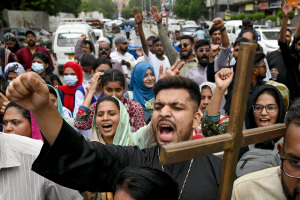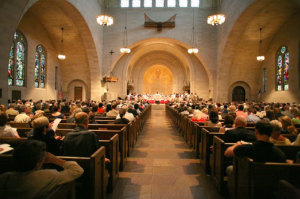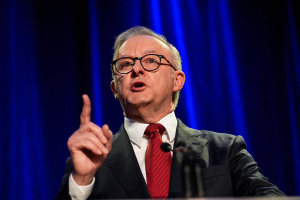Missionary: Haitians Still Searching for Answers
One year after the 7.0-magnitude earthquake struck close to Haiti's capital, Port-au-Prince, people are still searching for answers, said a long-time Haiti missionary.
David Carwell, program manager of Mission Aviation Fellowship in Haiti, acknowledged that the number of Haitians responding to the Gospel has declined since the days immediately following the quake, but he believes there will be another "surge" of people accepting Christ.
"The widespread openness to the Gospel really peaked about a month after the earthquake," Carwell said. "People were turning to the Lord everywhere. Even Mardi Gras parties were curtailed in 2010. But after that initial surge of relief aid tapered off, things slowly went back to the way they were. I believe we're going to see another surge of people turning to the Lord again this January."
The Illinois native described the atmosphere in Haiti as "somber" as the nation commemorates on Wednesday the day family and friends were lost in one of the greatest natural disasters of recent history.
A revised figure released by Prime Minister Jean-Max Bellerive on Wednesday has put the death toll from the quake at more than 316,000. The previous estimate was around 222,000 deaths.
The quake had also left the nation in rubble, rendering millions homeless.
"There is nobody that has not been impacted," said Carwell, who is on the ground. "Think about one in 10 people not here now; it's a huge change."
Though transportation and logistics is the primary function of MAF, the ministry is "involved in a lot of people's lives here."
Just a few weeks ago, MAF assisted a local Haitian in burying his eldest son.
The father had received a call from his 16-year-old son on December 31, reporting sick for work, Carwell recalled. The son died within 24 hours, before his parents discovered the severity of the situation.
"We helped with the funeral and went to the tent city just to experience what these people go through everyday," said Carwell.
The family lost their home in the devastation last year and is now raising their six remaining children within just an eight-square-foot area of a tent city.
"People cannot envision the sanitary conditions, how they cook, how they bathe, how to find clean water and how to find food to eat; it's a real struggle," he lamented.
Uncertainty among the community is also prevalent, with the recent cholera outbreak, which has counted 170,000 cases and over 3,500 deaths, according to the latest Ministry of Health figures, as well as the ongoing electoral crisis.
"There's an uncertainty as to who will be the next president and who will be involved in the government, so there are a lot of question marks in people's minds as they try to rebuild their lives," Carwell explained.
Haiti was already suffering from problems in sanitation, health and education before the earthquake hit. The task of building a stable nation after a year of mostly relief efforts appears daunting.
"We're not where we want to be and there are still a lot of problems," Carwell conceded.
"But the aid that's coming to Haiti is making a difference and in Jesus Christ there is hope, and we want to be faithful in doing our part each day."
MAF operations have enabled the work and maximized the effectiveness of local churches and ministries in Haiti since 1986, while executing 2,853 flights, transporting 7,296 passengers and delivering 799,000 pounds of cargo over the last 12 months.
According to the latest figures released by the International Organization for Migration, 810,000 people are still living in camps in Port-au-Prince and provinces. In July, the number of camp residents was 1.5 million.
Nigel Fisher, humanitarian coordinator for Haiti, said that though rebuilding in affected areas has been incremental, progress has still been made.
"After a rough period last year, coordination systems with the government, within the U.N., between ourselves and the donors are taking shape much more satisfactorily," Fisher stated Tuesday.





























